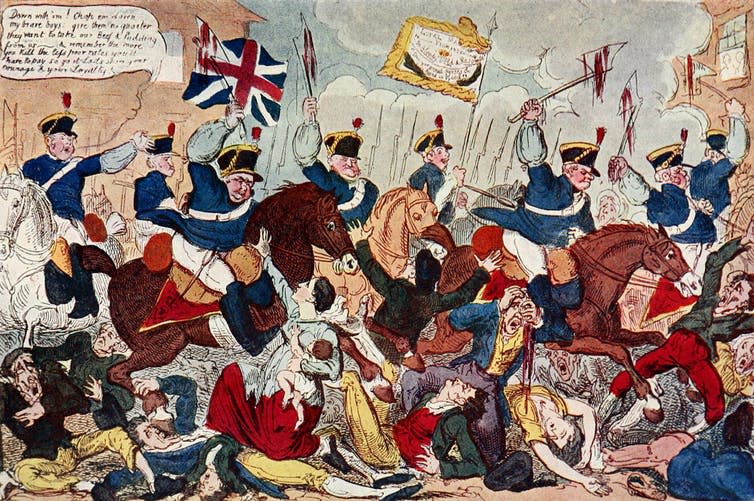Mike Leigh’s Peterloo: a worthy film that's long on detail and short on drama

Labour MP Chris Williamson certainly seems to have enjoyed Mike Leigh’s new film Peterloo, which recreates the 1819 massacre in St Peter’s Field in Manchester. Williamson, the Corbynite member for Derby North quoted in his enthusiastic tweet the Shelley poem, The Mask of Anarchy. Shelley wrote it to commemorate the massacre during which 15 people were killed and an estimated 700 injured when armed yeomanry attacked 60,000 peaceful pro-democracy and anti-poverty protesters.
Williamson is a keen supporter of Jeremy Corbyn’s leadership of the Labour Party – one that celebrates proletarian struggle and solidarity, even when it has sometimes led to conflict. The shadow chancellor, John McDonnell, infamously described the violent student protests of 2010 as “the best of our movement”. So it was always likely that Peterloo, a film about the bloody suppression of a popular demonstration would find favour on the left.
But when Leigh announced in April 2015 he was making a film about Peterloo, Corbyn was an obscure backbench MP fighting to retain his seat in that year’s general election campaign. The 2015 contest saw voters elect the first majority Conservative government in more than 20 years, with a mandate to continue to implement austerity measures. Leigh’s film has been released in a transformed context – having come close to winning the 2017 election with his promise to end austerity, Corbyn is widely believed to have reset the political agenda. And his mantra, “the many not the few” is clearly inspired by Shelley’s poem.
Leigh himself is reserved about what message should be derived from his film – at the Manchester premiere on October 17 he confined himself to vaguely noting that the film is: “Relevant to so much that is going on.”
Forgotten massacre?
It is striking how marginal a place Peterloo plays in popular accounts of Britain’s democratisation. The film sparked a debate about whether – and how – the massacre should be included in school history curricula. Meanwhile there is little evidence, beyond a small red plaque, to remind visitors to St Peter’s Square that they are on the site of the massacre.
Before its release some critics on the right of the political spectrum expressed fears that Leigh’s Peterloo would be a left-wing “fake history”. But few historians could criticise the film for inaccuracy: as a period drama its attention to surface detail is scrupulous. And substantively it presents a sober version of the past – Leigh reproduces (at some length) some of the key speeches of the time. This unfortunately makes the film feel longer that even its 154 minutes. Explanation of background issues such as Habeas Corpus and the Corn Laws is especially laboured. There are also too many characters – as Leigh squeezes as much historical detail as possible into the film. It feels hard to care too much about any of them.
Meanwhile, the almost complete absence of a soundtrack is presumably meant to contribute to the film’s seriousness – but unfortunately it only further undermines the film’s its impact as a drama.
Political subtext
Leigh does use his film to express a point of view but it is hardly controversial. He depicts an unfair society, one in which the Duke of Wellington receives government largesse for winning the Battle of Waterloo – while a soldier who fought under his command is shown as being rewarded with PTSD, unemployment and finally a yeoman’s sword in the belly for protesting about his fate.
Leigh makes it hard not to feel contempt for those Manchester magistrates and government ministers whose careless and callous disregard for the humanity of people calling for reform led to the Massacre. But few historians would say he got that call wrong – society in the years after Waterloo was hardly an egalitarian Utopia.
Even so, Leigh’s film shows the massacre as a cock up rather than a conscious act. The crowd did not hear the reading of the Riot Act which meant they did not know they had to disperse. But, that said, he certainly doesn’t spare the audience the full horror of the cavalry charge which concludes the film.
If Leigh treats the past with perhaps too much respect to make a compelling drama, others have been less scrupulous. Fearing Corbynites would use the film to further their attack on capitalism, Dominic Sandbrook, the Daily Mail’s favourite historian, even doubted Peterloo could be described as a “massacre”.
Meanwhile Corbyn’s speech at the Labour Party conference in September made great play on the associations of his movement with the legacy of the event, noting that it was an uncaring Tory government that sent in the troops.
Perhaps some Corbynites really do imagine Theresa May as a modern-day Lord Liverpool and her government as uncaring and oppressive as his. But someone should tell the 44% of working-class voters who backed the Conservatives in 2017 despite Corbyn’s call to end austerity. Such voters will decide whether Labour will win the next election or not, and they appear not to be much moved by the romance of proletarian struggle be it in the past or present.
This article is republished from The Conversation under a Creative Commons license. Read the original article.

Steven Fielding is a member of the Labour Party.

 Yahoo News
Yahoo News 

